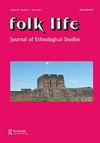重塑21世纪爱尔兰的饮食方式
IF 0.1
4区 社会学
0 FOLKLORE
引用次数: 0
摘要
食物和饮料是生活的基础,除了服装之外,它们是跨文化接触中最显著的文化差异性标志之一。目前,全球对手工、本地、传统、季节性和可持续的食物产生了兴趣,这些食物讲述了一个文化故事,北欧食品运动的流行或2021年Netflix系列《High on the Hog:非裔美国人美食如何改变美国》(High on the Hog: How African American Cuisine如何改变美国)就是例证。2019年,爱尔兰皇家学院出版了《100个单词中的爱尔兰历史》,其中有一个关于“食物和宴会”的特别章节,强调了面包、牛奶、苹果和蜂蜜作为标志性爱尔兰食物的重要性,并将饮用角、叉子、坩埚和冠军的部分“curadhmhír”作为爱尔兰历史上其他重要的文化元素。半个多世纪以来,食品历史在全球范围内不断发展壮大。在爱尔兰的背景下,距A.T.卢卡斯的开创性论文《马铃薯出现之前的爱尔兰食物》在这本杂志上发表已经60年了。其他研究爱尔兰食物历史、传统和习俗的个人包括Kevin Danaher、Fergus Kelly、Louis Cullen、Bríd Mahon,以及最近的Finbar McCormick、Katherine Simms和Patricia Lysaght。自从艾伦·戴维森和西奥多·泽尔丁创立牛津食品与烹饪研讨会以来,已经过去了40年。研讨会为国际人种学家和食品学者提供了一个网络和听众,如克劳迪娅·罗登,伊丽莎白·卢尔德和查尔斯·佩里展示他们的研究,更不用说爱尔兰的专题讨论会,如默特尔·艾伦,里贾纳·塞克斯顿,达里娜·艾伦Máirtín Mac Con Iomaire(现任客座编辑),多萝西·卡什曼,Diarmuid Cawley和Anke Klitzing,其中四人在《民间生活》这期关于爱尔兰食品方式的特别专题问题上表现突出。受牛津研讨会的启发,都柏林美食研讨会(DGS)于2012年举办,每两年举办一次。这次初次会面促成了2014年出版的《挠味蕾:爱尔兰文学和文化中的美食》一书,该书是彼得·朗的《重新想象爱尔兰》系列的一部分。这本编辑过的书聚焦于爱尔兰作家玛丽亚·埃奇沃斯、詹姆斯·乔伊斯、约翰·麦加恩和塞巴斯蒂安·巴里等人的美食镜头,同时探索了爱尔兰社会各个阶层的食品和饮料消费,从18世纪爱尔兰的精英家庭到20世纪50年代的都柏林公寓,以及随着米其林星级餐厅的激增和爱尔兰酒吧的广泛出口,爱尔兰作为一个“美食国家”的出现。DGS是都柏林理工学院(Cathal Brugha Street)的烹饪研究人员与Tallaght理工学院的法国-爱尔兰研究协会(AFIS)主要成员之间的合作,当时都柏林理工大学的项目只是一个理想。AFIS会议很快开始组织美食会议,进一步的食品相关章节出现在《重新想象爱尔兰》系列(参见第55卷、66卷、68卷和93卷)的其他编辑卷中,以及《2021年民间生活研究》第9卷和第14卷中。2,77 - 80 https://doi.org/10.1080/04308778.2021.1957194本文章由计算机程序翻译,如有差异,请以英文原文为准。
Reimagining Irish food ways for the twenty-first century
Food and drink are fundamental to life, and apart from costume, they are among the most noticeable markers of cultural otherness within intercultural encounters. There is a current global interest in foods that are artisanal, local, traditional, seasonal and sustainable, and that tell a cultural story, as witnessed by the popularity of the Nordic Food Movement, or the 2021 Netflix series High on the Hog: How African American Cuisine Transformed America. In 2019, the Royal Irish Academy published A History of Ireland in 100 Words, which had a special chapter on ‘Food and Feasting’ highlighting the importance of bread, milk, apples, and honey as iconic Irish foods, and including drinking horns, forks, cauldrons, and the champion’s portion ‘curadhmhír’ as other important cultural elements within Ireland’s history. Food history has been gaining momentum globally for over half a century. In an Irish context, it has been sixty years since A.T. Lucas’s seminal paper ‘Irish food before the potato’ was published in this very journal. Other individual researchers on Irish food history, traditions and customs included Kevin Danaher, Fergus Kelly, Louis Cullen, Bríd Mahon, and more recently Finbar McCormick, Katherine Simms and Patricia Lysaght. It has been forty years since Alan Davidson and Theodore Zeldin established the Oxford Symposium on Food and Cookery. The symposium provided both a network and an audience for international ethnographers and food scholars such as Claudia Roden, Elisabeth Luard and Charles Perry to showcase their research, not to mention Irish symposiasts such as Myrtle Allen, Regina Sexton, Darina Allen, Máirtín Mac Con Iomaire (the present guest editor), Dorothy Cashman, Diarmuid Cawley, and Anke Klitzing, four of whom feature in this special thematic issue of Folk Life on Irish food ways. Inspired by the Oxford Symposium, the Dublin Gastronomy Symposium (DGS) was organized as a biennial event in 2012. This initial meeting resulted in the publication of ‘Tickling the Palate:’ Gastronomy in Irish Literature and Culture in 2014, part of Peter Lang’s Reimagining Ireland series. This edited collection focused a food lens on Irish authors such as Maria Edgeworth, James Joyce, John McGahern, and Sebastian Barry, along with exploring food and drink consumption in various segments of Irish society from the elite households of eighteenth-century Ireland to the Dublin tenements of the 1950s, and on to the emergence of Ireland as a ‘foodie nation’ with the proliferation of Michelin starred restaurants and the widespread exportation of Irish pubs. The DGS was a collaboration between culinary researchers at Dublin Institute of Technology, Cathal Brugha Street and key members of the Association of Franco-Irish Studies (AFIS) at the Institute of Technology Tallaght, at a time when the TU Dublin project was only aspirational. AFIS conferences soon began to organize gastronomy sessions, and further foodrelated chapters appeared in a number of other edited volumes within the Reimagining Ireland series (cf. volumes 55, 66, 68 and 93), and in volumes 9 and 14 of the Studies in FOLK LIFE 2021, VOL. 59, NO. 2, 77–80 https://doi.org/10.1080/04308778.2021.1957194
求助全文
通过发布文献求助,成功后即可免费获取论文全文。
去求助
来源期刊
CiteScore
0.30
自引率
66.70%
发文量
17
期刊介绍:
Folk Life: Journal of Ethnological Studies is a journal devoted to the study of all aspects of traditional ways of life in Great Britain and Ireland. The journal publishes original, high quality, peer-reviewed research in the form of unsolicited articles, solicited papers (which are usually selected from those read at the Society"s annual conference) and of members" papers (which are usually short reports of work in progress). Work published in Folk Life may include, for example, papers dealing with the traditional ways of life of other countries and regions, which may be compared to or contrasted with those of Great Britain and Ireland.

 求助内容:
求助内容: 应助结果提醒方式:
应助结果提醒方式:


